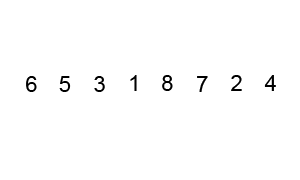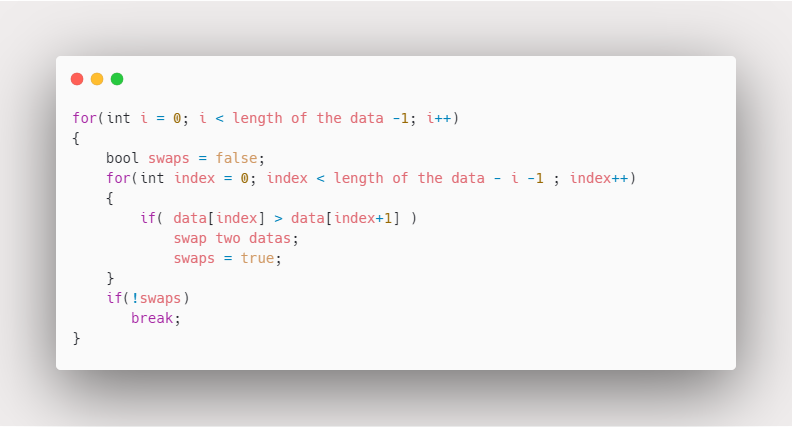Algorithm - Bubble Sort (Concept,Pseudocode and C++ code)
Bubble sort
Bubble sort: repeatedly steps through the list, compares two adjacent datas and swaps them if they are in the wrong order

Code Design
- condition check : Compare two datas
- turn : One rotation turn of condition check for all list
-
two datas for bubble sort
(3 2)
(2 3)
condition check : 1
turn : 1 -
tree datas for bubble sort
(5 4 3)
(4 3 5)
(3 4 5)
condition check : 2
turn : 2 -
four datas for bubble sort
(5 4 3 2)
(4 3 2 5)
(3 2 4 5)
(2 3 4 5)
condition check : 3
turn : 3
Pseudocode
- length of the entire data - i -1
- The reason for - i
- the bubble sort will be executed only on unsorted data
- last index of the list will be sorted every each turn
- therfore, reduce the number of repetitions (reduce the count of the loop)
- for num in range(len(data_list)) : repeat
swap = false(make a flag to check swap was executed)- Inside the second roop, for index in range(len(data_list) - i - 1) : repeat
- If data_list[index] > data_list[index + 1]
- Swapping two datas
swap = true
- If swap == false : break, because the list is already sorted
Time Complexity
two for loops : $O(n^2)$
If entire lists are already sorted, the time complexity is O(n)
C++ code implementation
#include<iostream>
using namespace std;
void bubbleSort(int * data, int size)
{
for(int i = 0; i < size-1 ; ++i)
{
bool swaps = false;
for(int index = 0; index < size - i - 1; ++index)
{
if(data[index] > data[index+1])
{
int temp = data[index];
data[index] = data[index+1];
data[index+1] = temp;
}
swaps = true;
}
if(!swaps)
break;
}
}
int main()
{
int list_b[] = {5,4,3,2,1};
int len = sizeof(list_b) / sizeof(list_b[0]);
cout << len << endl;
for(int i = 0; i < len; ++i)
cout << list_b[i] << endl;
bubbleSort(list_b, len);
for(int i = 0; i < len; ++i)
cout << list_b[i] << endl;
return 0;
}

